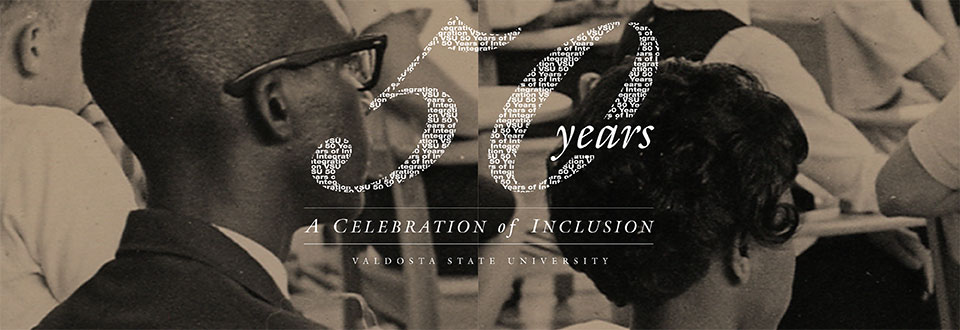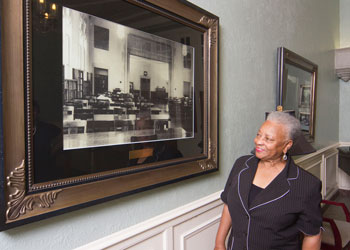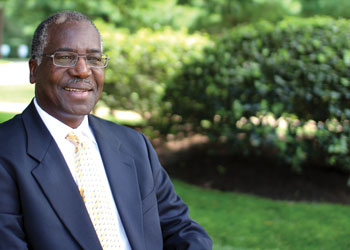In 1963, President John F. Kennedy dealt with issues surrounding peace, both in relationship to the possibility of war with the Soviet Union and at home with the moral crisis of civil rights and segregation.
In a televised speech to the American people, June 11, 1963, Kennedy outlined his plan for civil rights legislation.
“We are confronted primarily with a moral issue. It is as old as the scriptures and is as clear as the American Constitution. The heart of the question is whether all Americans are to be afforded equal rights and equal opportunities, whether we are going to treat our fellow Americans as we want to be treated. If an American, because his skin is dark, cannot eat lunch in a restaurant open to the public, if he cannot send his children to the best public school available, if he cannot vote for the public officials who will represent him, if, in short, he cannot enjoy the full and free life which all of us want, then who among us would be content to have the color of his skin changed and stand in his place? Who among us would then be content with the counsels of patience and delay?”
On Sept. 17, 1963, three months after Kennedy’s speech to the nation, Valdosta natives Drewnell Thomas and Robert Pierce Jr. led the way for integration at Valdosta State College (VSC).
According to records within the university’s archives, then VSC President J. Ralph Thaxton said that he “discussed the possibility of integration with various civic groups and I believe that we had the field rather prepared for integration when the opening of the college came. An injunction was taken out against me, but very little effort was made to serve injunction paper on me. The students had been registered before they located me. We were threatened with some disorder by a group from Pavo, Ga., and the group did show up on the campus at registration time. However, the presence of a considerable number of state highway patrolmen and some local city police officers discouraged this group from Pavo and they left the campus and there was no disorder of any kind.”
A Valdosta Daily Times article recounting Thaxton’s recollection of the events on Sept. 17, 1963, confirmed the presence of state and local police were visible. However, the article noted, “Seemingly it was just the start of another fall quarter. It was merely a routine beginning for the crowd of fresh faces on the campus.”
Pierce and Thomas settled into their campus routines, and four years later graduated. As they reflect on the past 50 years, they realize that they were more than just two college students.
They played a pivotal role in forging a historical and cultural legacy that continues at Valdosta State University.
Growing up, the youngest of six children, Drewnell Thomas was the first in her family to attend college. However, some of her siblings later received college and postgraduate college degrees.
At 17 years old, Thomas graduated with honors from Valdosta’s Pinevale High School. She fondly remembers her teachers mentoring and encouraging her and other classmates to attend college.
“Going to college was something I knew I wanted to do,” said Thomas, who lives in Atlanta, Ga.
She and many of her high school classmates were making plans to leave Valdosta to attend colleges out of town.
“I knew I was going to college; what I didn’t know was how I was going to pay for it,” said Thomas.
She was accepted at Howard University (Washington, D.C.) and Hampton College (Hampton, Va.) was her second choice.
Thomas never thought of attending Valdosta State College, but after being offered a full scholarship from the Negro Voter League, she decided to attend VSC. Thomas did not think about the challenges or obstacles that she might face and she knew that something special was about to happen in her life.
“I decided to go and be a student. You do what you have to do and keep on moving,” said Thomas. “You don’t look at it…it may be awesome and monumental, but if you look at it that way, you might not ever get it done. So you just start that journey and keep going.”
Thomas admits that she did not consider herself a pioneer because of her admission to VSC. However, she now recognizes the positive impact it had on her life and the lives of others.
“I felt that something special was happening because of Robert Pierce’s and my presence at Valdosta State College,” said Thomas. “It affirmed for me that oftentimes people may not do things until they get ideas from others. Once a pathway is created, others sometimes follow and make a small pathway into a road of opportunity.”
She vividly remembers the first day of school. Wearing a new two-piece pale pink shirtwaist dress and matching pink shoes; while she noticed other students wore saddle oxford shoes. Thomas soon exchanged her high heel shoes for saddle oxfords and penny loafers. The school of more than 900 students seemed large. She quickly settled into her classes and even joined campus groups. A very social person, Thomas became a member of the Collegiate Christian Association, and the Glee Club.
She knows that some of the challenges she faced 50 years ago are the same that college students face today.
“When I went to school, I went to study and work, but I had to balance my studies with a sense of play and friendship,” said Thomas, who recalls walking several miles to school and back home each day. “In addition to getting a degree, college is a place for students to finish growing, maturing and learning how to live. Students often think they already know everything about living.”
After graduating in 1967 with a degree in sociology, Thomas earned a master’s degree in social work from Atlanta University. Most of her professional life was spent in helping others, including work with the Department of Family and Children Services and as the founding executive director of ComCare Housing, which provided supportive housing (apartments and group homes) for persons with special needs.
A community activist, Thomas does not shy from a challenge or an issue that needs attention. She ran for Georgia’s District 39 Senate post in 1988, 1990, and 1992 and was heavily endorsed by the Atlanta Journal-Constitution newspaper and by other organizations.
Though she did not win the Senate race, her desire to be an advocate for change was not diminished.
“Instead of being crushed, because losing hurts, it makes you stronger,” said Thomas. “I didn’t win the political race, but I won in other ways. I never stopped being an advocate for issues that I thought were important. Also, I won because through my efforts to become a Georgia state senator, other women recognized their own political potential, ran for offices and won.”
In 1993, during the presidency of Hugh C. Bailey, Thomas used her political connections and clout to help her alma mater with securing regional university status.
“I remember when Valdosta State was competing for university status,” said Thomas. “After Dr. Bailey discussed with me the school’s efforts to achieve university status, this discussion led me to testify before the Georgia State Senate Education Committee and ask my friends in the Atlanta legislative delegation to support VSC’s status as a university.”
Growing up in South Georgia, Thomas understood the importance of regional university status to Valdosta State and to the southern region of the state.
“Valdosta State was growing, and university status would provide more opportunities in South Georgia,” Thomas said. “I supported this effort because…I am a product of Valdosta State College, and I’m from Valdosta, Georgia.”
The mother of two sons, Michael and Chad, Thomas continues to advocate for issues through her blog “Drew’s Views and News Exchange,” which provides open topics impacting her neighborhood, the federal government, unfair treatment of people, and numerous social issues.
Thomas is past president of the Atlanta Planning Advisory Board, a member of the City of Atlanta License Review Board, founder and president of the Historic Westin Heights/Bankhead Neighborhood Association Inc., and a board member of the League of Women Voters-Atlanta Fulton.
It is her passion and work with the neighborhood association that currently keeps her involved and civically engaged. She recently established the neighborhood association to help restore pride in the community she has lived in for several decades. She calls her advocacy, “My God’s work.”
“I want to have the neighborhood correctly identified as Historic Westin Heights/ Bankhead Neighborhood with signs properly placed at the entrance to the community,” Thomas said. “I want us to create and restore pride in our neighborhoods.”
At 67 years old, Thomas has no plans to retire from community work; others are depending on her voice to open the doors for change as she did 50 years ago when she proudly walked onto the campus of Valdosta State College.
“Attending college created for me new lenses through which I could see the world, and it presented work and life opportunities that otherwise would not have been available for me,” Thomas said.
Growing up in Valdosta, Robert Pierce Jr. said the road to college was directed through the encouragement of his parents, Robert Sr. and Beatrice Martin Pierce, and three older sisters who preceded him in attending college and business school.
“Both of my parents stressed the importance of education throughout our elementary, secondary and post-secondary education,” said Pierce. “They encouraged all of us to get as much of an education as we possibly could because it would qualify us to earn a better living.”
Pierce credits his teachers and administrators at Pinevale High School with reinforcing the goal of a college degree.
“On every occasion when he spoke with us at assemblies, our junior high school principal, Mr. James Lomax, would always stress the theme to be the best at whatever you choose to be,” said Pierce, who graduated with honors from Pinevale High School. “Not only did my high school band director, Mr. Carter Marshall, encourage us to go to college, he actively sought out scholarships to various historically black colleges and universities. Mr. Marshall and another one of my high school teachers, Mr. Isaiah Isom, were instrumental in encouraging me to apply to attend VSC.”
There was a community push for integration at Valdosta State College and many local business leaders were encouraging Pierce to attend college locally.
“One thing that I remember is that I was interviewed by VSC President Dr. Ralph Thaxton when I sought to enter VSC,” said Pierce. “I was accompanied by local businessman Mr. Woodrow Harris, who spoke on my behalf and other African-American students should they choose to apply. He talked about our right as taxpayers to a fair share of the available slots. Segregation had been declared unconstitutional for nine years by the time the college made its decision to end the practice. African-American students, too, would now have the choice of attending a public college in their hometown, thus making college more affordable.”
Pierce remembers his first day as a freshman. He was driven to campus by Dr. Walter Lang, a local African-American doctor, along with a police escort. Upon arrival, Pierce recalls being notified that a group of white parents from Americus, Ga., had requested a court order preventing he and Drewnell Thomas from entering VSC.
The court order was denied, and Pierce and Thomas began their college life.
“A lasting impression regarding our admission to the college is that, in admitting us, VSC was allowing us access to one aspect of college life but not the whole experience,” said Pierce. “Since we were commuting students who lived at home, the college left the issue of integration of the residence halls for another day.”
Pierce fondly remembers a ceramics class and encouragement he received from some of the VSC faculty members.
“Several faculty and staff members encouraged me during my time at VSC. The one I remember most is Dr. Duval, my chemistry professor,” said Pierce, who graduated from VSC with a degree in biology. “He kept abreast of my progress and would go out of his way to offer a word of encouragement or advice.”
Pierce said, as a student, he did not realize the impact of his admission to VSC.
“Since I had three older sisters who preceded me, I felt they were the real pioneers for me and my siblings,” said Pierce. “They were all very smart and hardworking, so they set the bar high for me to follow.”
Pierce believes that he and Thomas were pioneers in respect to the integration of VSC and opened the doors for others, including five of his siblings, Ralph, Evelyn, Katherine, and Jacqueline, who all graduated from VSC. His sister, Angela, attended VSC and transferred to University of Maryland.
After graduating from VSC in 1967, Pierce moved to Greenwood, Miss., to work for the U.S. Department of Agriculture. He was drafted into the Army, where he served as an intelligence analyst and interrogator in Vietnam. After completing his service with the Army, Pierce returned to work with the U.S. Department of Agriculture and moved throughout the East Coast. He later transferred to the U.S. Department of Education and worked within the Office for Civil Rights.
In his position with the U.S. Department of Education, Pierce supervised a compliance team that conducted civil rights complaint investigations and compliance reviews and provided technical assistance to state and local education agencies, colleges and universities, and others that received federal funding.
“I most enjoyed the resolution of civil rights complaints to the mutual satisfaction of all parties. Most complaints were resolved voluntarily and very few needed to be referred for enforcement action,” said Pierce. “I also enjoyed the achievement of positive change through the resolution of complaints.”
Pierce is enjoying retirement with his wife, Stella Marshall Pierce, Ed.D., in Beverly, Mass. They are the parents of four young adults, Justin, Joseph, Joi, and Julie, and have nine grandchildren.
The two enjoy volunteering in various organizations, including the African American Historical and Genealogical Society-New England Chapter. They are also members of the U.S. Coast Guard Auxiliary and assist with conducting tours of the Historic Point Lighthouse and on-the-water safety patrols. They are also active members of the Beverly Democratic City Committee, where Robert Pierce serves as recording secretary, and last year was elected as a member of the Massachusetts Democratic State Committee.



